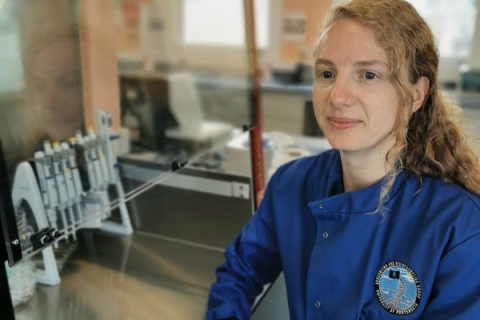

The research is to look for new naturally occurring enzymes that can degrade plastic back into its chemical building blocks
23 June 2022
3 min read
The University of Portsmouth has been awarded funding to look for new plastic-eating enzymes.
Angie Beckett, a Specialist Research Technician in the University’s Centre for Enzyme Innovation, will receive £25,000 to use genome sequencing to search for new naturally occurring enzymes that have the potential to degrade plastic back into its chemical building blocks.
The University is pioneering the use of enzymes to digest plastics such as polyethylene terephthalate (PET). PET is the most common thermoplastic, used to make single-use drinks bottles, clothing and carpets and it takes hundreds of years to break down in the environment.
The plastic-eating PETase enzyme breaks down PET back into its building blocks, creating an opportunity to recycle plastic infinitely and reduce plastic pollution and the greenhouse gases driving climate change. The University hopes to create similar cycles for other types of commonly used plastic.
Nature often holds the key to these problems, so we intend to take samples from the environment and see if we can find the answers. Using sequencing to look at the DNA of bacteria living in close contact with plastic, we hope to discover new plastic-eating bacteria. I’m very excited to do this research and see what we can find.
Angie Beckett, Specialist Research Technician in the Centre for Enzyme Innovation
Angie said: “Although we have discovered enzymes that can break down PET, there is still some improvement needed to make it ready for plastic-recycling. There are also many other types of plastic that we need to figure out how to break down. Nature often holds the key to these problems, so we intend to take samples from the environment and see if we can find the answers. Using sequencing to look at the DNA of bacteria living in close contact with plastic, we hope to discover new plastic-eating bacteria. I’m very excited to do this research and see what we can find.”
The funding is provided by the COVID-19 Genomics UK (COG-UK) consortium, who launched the new scheme to give back to consortium members whose research had been delayed by their work on SARS-CoV-2 sequencing. Angie was a member of the south coast sequencing hub, which undertook genome sequencing and analysis to track COVID-19 transmission, inform public health policy, and to support the establishment of a national pathogen surveillance service.
